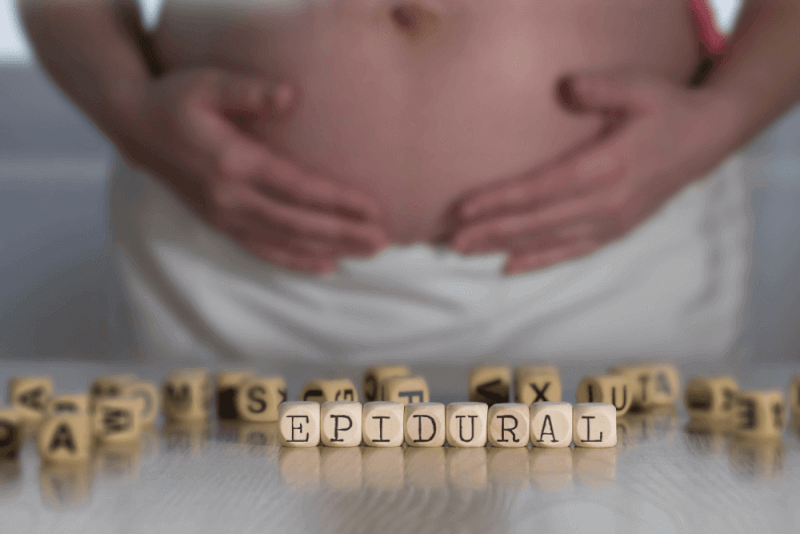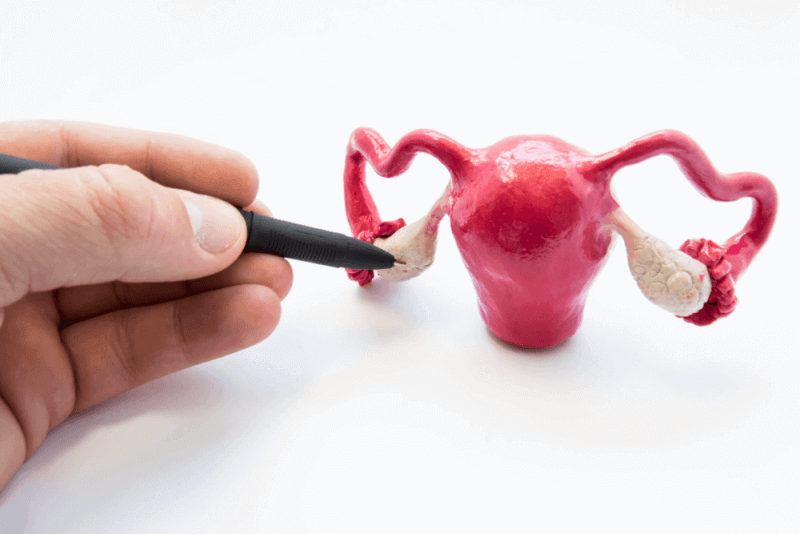What is an ectopic pregnancy?
The first stage of pregnancy is the fertilization of an egg cell with a sperm cell. Under normal circumstances, the fertilized egg attaches to the uterine wall. In an ectopic pregnancy, the fertilized egg is located outside the main cavity of the uterus and continues to grow there.
Ectopic pregnancy usually occurs in the fallopian tubes, which carry the eggs from the ovaries to the uterus. In some cases, the fertilized egg can also occur in other parts of the body, such as the abdominal cavity or the lower part of the uterus that connects to the vagina.
In ectopic pregnancy, the child does not develop normally. This is because the fertilized egg cannot survive and failure to treat the growing tissue can lead to life-threatening bleeding.
Causes of ectopic pregnancy
The most common type of ectopic pregnancy is tubal pregnancy. It occurs when a fertilized egg gets stuck in the tubes on its way to the uterus. The cause of this entrapment is usually damage to the fallopian tube due to inflammation or deformities. Hormonal imbalances or abnormal development of the fertilized egg can also cause compression
Symptoms of ectopic pregnancy
In the early stages of an ectopic pregnancy, no symptoms may be noticed. However, some women with ectopic pregnancy may experience early signs of pregnancy such as delayed menstruation, breast tenderness and nausea. In ectopic pregnancy, even if the pregnancy test result is positive, the pregnancy does not continue normally. Symptoms become more pronounced as the fertilized egg grows.
Early warning signs of ectopic pregnancy
The early warning signs of ectopic pregnancy are usually mild vaginal bleeding and pelvic pain. If blood leaks from the fallopian tubes, pain in the shoulder or the urge to defecate may be felt. The specific symptoms vary depending on the location of the blood collection or irritated nerve.
Emergent symptoms of ectopic pregnancy
The continued growth of the fertilized egg in the fallopian tubes can cause the tube to rupture. This can cause heavy bleeding in the abdomen and symptoms such as extreme dizziness, fainting and shock, which can be life-threatening.
Diagnostic criteria for ectopic pregnancy
In order to diagnose an ectopic pregnancy, a pelvic examination is first performed. During this examination, it is possible to identify areas of pain, tenderness or masses in the fallopian tube or ovary. However, it is impossible to diagnose an ectopic pregnancy by pelvic examination alone. Blood tests and ultrasound imaging are also needed.
Pregnancy test
An HCG blood test is needed to identify whether a person is pregnant or not. During pregnancy, the level of this hormone increases significantly, resulting in significant amounts of the hormone being found in the blood and urine. In health care facilities, a blood test is usually used to confirm pregnancy. The blood test may need to be repeated every few days until an ultrasound can confirm or rule out an ectopic pregnancy.
Ultrason
Transvaginal ultrasound allows the doctor to see the exact location of the pregnancy. For this imaging, a wand-like device is inserted into the vagina. It then uses sound waves to create images of the uterus, ovaries and fallopian tubes, which are sent to a nearby monitor. The ultrasound wand can be moved over the abdomen to confirm pregnancy or assess internal bleeding.
Other blood tests
Patients should also have a complete blood count to check for other signs of blood loss or anemia. If an ectopic pregnancy is diagnosed, patients may need a blood transfusion. For this reason, blood tests are also performed to determine the blood group.
Ectopic pregnancy treatment methods
The ectopic tissue must be removed because it can cause life-threatening complications in which the fertilized egg cannot develop normally outside the uterus. The treatment varies depending on the symptoms and when the ectopic pregnancy was discovered. Treatment options include medication, laporoscopic surgery or abdominal surgery.
Methotrexate injection therapy
In early ectopic pregnancies with unstable bleeding, a drug called metodrexate is usually used to stop cell growth and dissolve existing cells. This drug is given to patients by injection. The most important point is to make a definitive diagnosis of ectopic pregnancy before applying treatment.
After the injection, specialists perform a second HCG test to determine how well the treatment is working and whether more medication is needed.
Ectopic pregnancy surgery
If an ectopic pregnancy is not diagnosed early, the tissue must be removed through surgical procedures.
Methods of ectopic pregnancy surgery
Different methods are used in ectopic pregnancy surgeries. The procedure varies depending on the patient's condition and the urgency of the situation. This procedure includes the following procedures.
Laparoscopic procedures
There are 2 laparoscopic procedures commonly used to treat ectopic pregnancy. In these procedures, a small incision is made in the abdomen, near or inside the navel. Specialists then use a thin tube equipped with a camera lens and light to visualize the tubal area.
In the salpingostomy method, the tissue growing in the fallopian tubes is removed and the tube is left to heal on its own. In the salpingectomy method, the tube is removed along with the tissue.
The decision on which procedure to perform in laparoscopic surgery depends on the amount of bleeding, damage and whether the tube has ruptured. It is also necessary to consider whether the other fallopian tube is normal and whether it shows signs of previous damage.
Emergent surgical intervention
If an ectopic pregnancy causes severe bleeding, emergency surgery is required. In emergency cases, laparoscopic surgery can be performed as well as abdominal laboratomy surgery. In some cases it is possible to save the fallopian tubes, but usually the ruptured tube must be removed.
Complications of ectopic pregnancy surgery
Complications of surgery for the treatment of ectopic pregnancy include the following.
- Ağrı
- Fatigue
- Bleeding
- Infection
Recovery after surgery for ectopic pregnancy
Recovery after surgery for ectopic pregnancy varies depending on when the condition was diagnosed and the treatment received. In some women, the pregnancy ends spontaneously and the body recovers without many side effects. If ectopic pregnancy is treated with medication, patients may feel tired for a few weeks and may experience some abdominal pain. In addition, side effects that patients may experience after medication include the following.
- Spotting or vaginal bleeding
- Nausea or diarrhea
- Dizziness
If surgical treatment for ectopic pregnancy has been performed, patients should rest for 2-4 weeks. During this time, abdominal pain, swelling and vaginal spotting or bleeding are normal. The majority of patients can return to work and other daily activities about 2 weeks after surgery. However, the instructions that patients should follow are the recommendations of their surgeons. For this reason, patients are prohibited from exercising and heavy lifting until the specialists give permission.
Emotional recovery after an ectopic pregnancy
Extended pregnancy causes not only physical but also emotional problems. It is especially common for patients who are trying to get pregnant to experience emotional trauma. Many patients experience guilt, anger, fear and sadness. In order to recover from the emotional effects of this traumatic experience, they need to be supported by family and friends. It is also recommended to consult with mental health professionals.
What should people with an ectopic pregnancy pay attention to?
If a person has an ectopic pregnancy once, it may recur later. In addition, people who have had an ectopic pregnancy can also give birth successfully. However, it is extremely important that they do not neglect their controls. Patients should wait at least 3 months after treatment to get pregnant.
Risk factors for ectopic pregnancy
There are some factors that increase the risk of ectopic pregnancy. These risk factors include the following.
- Having had an ectopic pregnancy before
- Inflammation or infection
- Fertility treatments
- Tube surgery
- Contraception with intrauterine device
- Smoking
- Be over the age of 35
- Having a sexually transmitted infection
- Presence of scars from pelvic surgery
When does an ectopic pregnancy become obvious?
Ectopic pregnancy is usually diagnosed at 6 weeks of pregnancy. This is because a significant proportion of patients do not show any early signs of ectopic pregnancy. In these cases, the diagnosis can only be made by ultrasound scanning. In cases where symptoms appear, the diagnosis of ectopic pregnancy is usually known from 5 weeks.
How does an ectopic miscarriage happen?
In the case of an ectopic pregnancy, miscarriage is usually caused by damage or rupture of the fallopian tube. This can cause symptoms such as vaginal bleeding, severe abdominal pain and fainting. In case of ectopic pregnancy, if the fallopian tubes rupture and miscarriage occurs, urgent medical intervention is required.
External pregnancy sites
Ectopic pregnancy usually occurs in the fallopian tubes, but the egg can also develop in other areas outside the uterus. Other types of ectopic pregnancy include the following.
Ovarian ectopic pregnancy
Ovarian ectopic pregnancy is a type of ectopic pregnancy in which the fertilized egg implants outside the ovary. This type occurs because of problems with the way the body releases eggs during the menstrual cycle. It is possible for an egg to be fertilized while it is still in the follicle, and an ectopic pregnancy can occur while the egg is moving through the fallopian tubes to the uterus.
Ectopic pregnancy of the abdomen
Although rare, pregnancy can also occur in the space between the abdominal wall and the spine. In this type of ectopic pregnancy, the movement of fluid in the abdomen can move the egg behind the uterus and cause the sperm to fertilize it, or the embryo can pass from the reproductive tract through the lymphatic channels into the abdominal cavity.
Cervical ectopic pregnancy
Cervical ectopic pregnancy, which occurs when a fertilized egg implants in the cervical canal, is caused by damage to the uterine cavity.
Cesarean scar ectopic pregnancy
This is when a fertilized egg attaches to scar tissue in the caesarean section. Because scar tissue is weaker than the lining of the uterus, it can rupture and cause heavy bleeding. Symptoms of this type of ectopic pregnancy include bleeding from the vagina and lower abdominal pain.
Complications of external pregnancy
Extended pregnancy is a medical emergency. Because the uterus is the only organ that can carry a growing fetus. Any area other than the uterus, which adapts to the growth of the fetus, is not suitable for the development of the fetus. For this reason, there are some complications caused by ectopic pregnancy.
- Rupture of fallopian tubes
- Internal bleeding
- Other organ injuries
- Death
- Hemorrhagic shock








